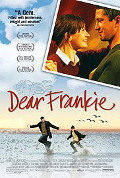
Directed by
Shona Auerbach
105 minutes
Rated M
Reviewed by
Sharon Hurst

Dear Frankie
Synopsis: Nine-year-old Frankie (Jack McElhone) is deaf, and lives with his mum, Lizzie (Emily Mortimer), and his grandma, Nell (Mary Riggans). The family moves constantly to avoid Frankie's abusive father, but Lizzie has always hidden this fact from the boy. Every week Frankie writes to his seagoing dad, but when the ship he believes he is aboard actually turns up Lizzie goes in desperate search of The Stranger (Gerard Butler) who, for a fee, will pose as Dad for a day.The plot for this film might sound potentially schmaltzy but first-time director Auerbach guides it with a measured hand and uses understatement to wonderful effect in extracting emotional truths about her characters. From the opening shots we know we are in for that sort of British film that serves up a slice of "the everyday", as Grandma, Lizzie and Frankie putter along in a beat-up van, Gran smoking like a chimney, all their possessions in the back, and Frankie's voice-over declaring that Mum said this should be their last move, but he doubts it.
Although on one level the plot is simple, it is the complexities of the characters and their motivations that has us fascinated. Frankie is a very bright boy, and we are never sure just how much he knows of his mother's cover-up. He loves all things to do with the ocean, and many lovely sea images are subtly interwoven throughout the film, underpinning Frankie's sense of loneliness and longing. His cheeky sense of humour is also nicely portrayed, especially in the way he relates to some of his schoolmates. Frankie only verbalises three words in the entire film, and McElhone is marvellous at conveying the whole gamut of emotions simply through his facial expressions.
The Stranger also is a man of few words but Butler brings an underlying depth and tenderness to this person, who perhaps has as many secrets to hide as Lizzie does. Mortimer gives a restrained performance as the almost repressed and fearful Lizzie and yet manages to hint at a strength that has obviously been needed to hold it all together.
The film's look is very specific - the Scottish Clyde cost where writer Andrea Gibb grew up. Auerbach, who also acts as cinematographer, works to keep the writer's very Scottish vision, with many grey and moody scenes of the dockyards and the hills overlooking them. By comparison, internal scenes are lit with a warm glow, reflective of Frankie's tight-knit, supportive little family. Some of the smallest moments in this film are the most affecting - simple human interactions, lines quietly delivered but which reveal important truths, and an ending with a gentle twist and a measure of hope.

Want more about this film?


Want something different?




